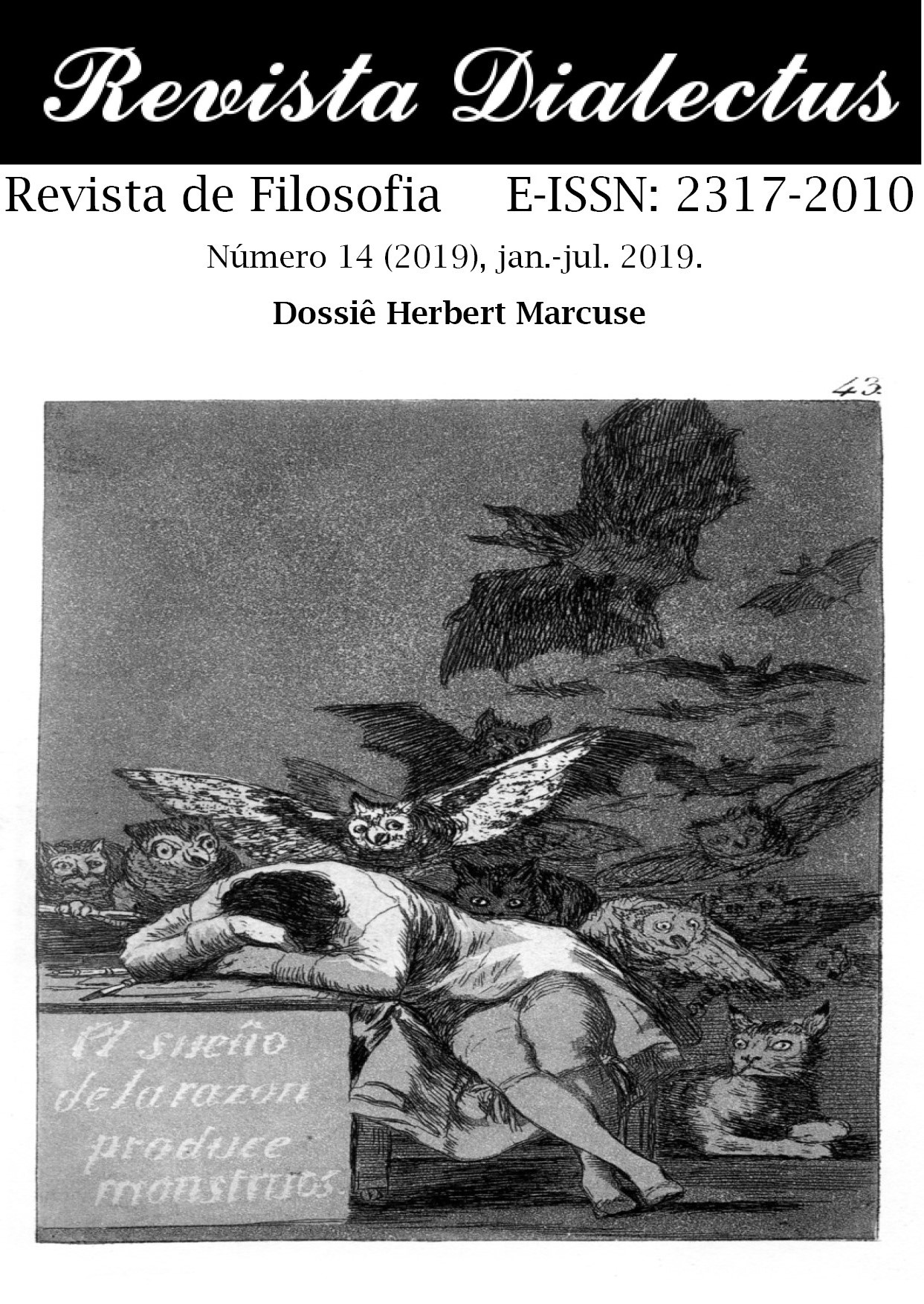HERBERT MARCUSE E A TEORIA CRÍTICA: PARA ALÉM DA PERSPECTIVA NORMATIVA DA ESCOLA DE FRANKFURT
DOI:
https://doi.org/10.30611/2019n14id41614Keywords:
Herbert Marcuse, Normatividade, Democracia, Teoria Crítica, AutoritarismoAbstract
Nosso ensaio procura compreender o sentido atual da Teoria Crítica de Herbert Marcuse. De início, fazemos a contraposição de Marcuse à versão mais contemporânea da Teoria Crítica, representada pela perspectiva normativa de Jürgen Habermas e Axel Honneth. Notamos, em seguida, a insuficiência deste modelo crítico diante dos desafios contemporâneos, conforme a crítica de John Abromeit e Amy Allen. Ambos apresentam os limites da segunda geração para compreender o avanço do pensamento conservador. Recuperamos aqui as reflexões de Marcuse sobre os limites da democracia burguesa nos anos 1970. Este será o mote para pensarmos uma perspectiva de Teoria Crítica diversa da normatividade. A experiência crítica de Marcuse é marcada pelo contorno dos acontecimentos e dos corpos, o conteúdo material das questões morais – elementos centrais para o embate contra a cultura do medo que alimenta o autoritarismo nas vias democráticas.
References
ADORNO, T. W. “O que significa elaborar o passado”. In: ADORNO, T. W. Educação e emancipação. Tradução de Wolfgang Leo Maar, Rio de Janeiro: Paz e Terra, 1995.
ALLEN, A. The end of progress: decolonizing the normative foundations of critical theory. New York: Columbia University Press, 2016.
BENHABIB, S. Critique, norm, and utopia: a study on the Foundations of Critical Theory. New York: Columbia University Press, 1986.
BUTLER, J. Corpos em aliança e a política das ruas: Notas para uma teoria performativa de assembleia, tradução de Fernanda S. Miguens, Rio de Janeiro: Civilização Brasileira, 2018.
CARNEIRO, S. A paralisia da crítica e a democracia como tabu. In: Revista Fevereiro, vol. 7, http://www.revistafevereiro.com/pag.php?r=07&t=08 (acessada em 15/12/2018).
FARR, A. In search of radical subjectivity: rereading Marcuse after Honneth. In: Radical philosophy review, vol. 16, nº 1, 2013.
FORST, R. Justificação e crítica: perspectiva de uma teoria crítica da política. Tradução de Denilson L. Werle, São Paulo: Ed. UNESP, 2018.
FRASER, N e HONNETH, A. Redistribution or recognition? A political-philosophical exchange, translated by Joel Golb et al., London, New York; Verso, 2004.
HABERMAS, J. O discurso filosófico da modernidade: doze lições. Tradução de Luiz Reppa et al. São Paulo: Martins Fontes, 2000.
________. Why Europe needs a constitution? In: New left review, vol. 11, sept-oct 2001, https://newleftreview.org/II/11/jurgen-habermas-why-europe-needs-a-constitution (acessado em 15/12/2018).
HONNETH, A. Teoria crítica. In: GIDDENS, A et al. (org.). Teoria social hoje. Tradução de Gilson C. C. de Souza, São Paulo, Ed. UNESP, 1999, p. 503-552.
_______. Luta por reconhecimento: a gramática moral dos conflitos sociais, tradução de Luiz Repa, São Paulo: Ed. 34, 2003.
_______. Disrespect: the normative foundations of critical theory. Cambridge, Malden: Polity Press, 2007.
HORKHEIMER, M. Teoria tradicional e teoria crítica. In: BENJAMIN, W. et al. Os pensadores, traduções de José L. Grünnewald et al. São Paulo: Ed. Abril Cultural, 1983, p. 117-154.
MARCUSE, H. Eros and civilization: a philosophical inquiry into Freud. Boston: Beacon Press, 1966.
_______. Soviet marxism: a critical analysis. New York: Columbia University Press, 1985.
_______. One-dimensional man: studies in the ideology of advanced industrial societies. London: New York: Routledge, 1991.
_______. Filosofia e teoria crítica. In: MARCUSE, H., Cultura e sociedade. Traduções de Wolfgang L. Maar et al. Volume 1. São Paulo: Paz e Terra, 1997, p. 137-160.
_______. The historical fate of bourgeois democracy. In: MARCUSE, H. Towards a critical theory of society – collected papers of Herbert Marcuse. Volume 2. London, New York: Routledge, 2001, p. 163-186.
_______. Reflections on French revolution. In: MARCUSE, H. The new left and the 1960s – collected papers of Herbert Marcuse. Volume 3. London, New York: Routledge, 2005, p. 40-45.
Downloads
Published
Issue
Section
License
Authors who publish in this journal agree to the following terms:
- Authors retain the copyright and grant the journal the right of first publication, with the work simultaneously licensed under the Attribution-NonCommercial-NoDerivatives 4.0 International (CC BY-NC-ND 4.0) License, which allows the non-commercial sharing of work, without modifications and with acknowledgment of authorship and initial publication in this journal.
- Authors are authorized to take additional contracts separately, for non-exclusive distribution of the version of the work published in this journal (eg publish in institutional repository or as a book chapter), with acknowledgment of authorship and initial publication in this journal.
- Authors are allowed and encouraged to publish and distribute their work online (eg in institutional repositories or on their personal page) at any point before or during the editorial process, as this can generate productive changes as well as increase the impact and citation of published work (See The Free Access Effect).



















